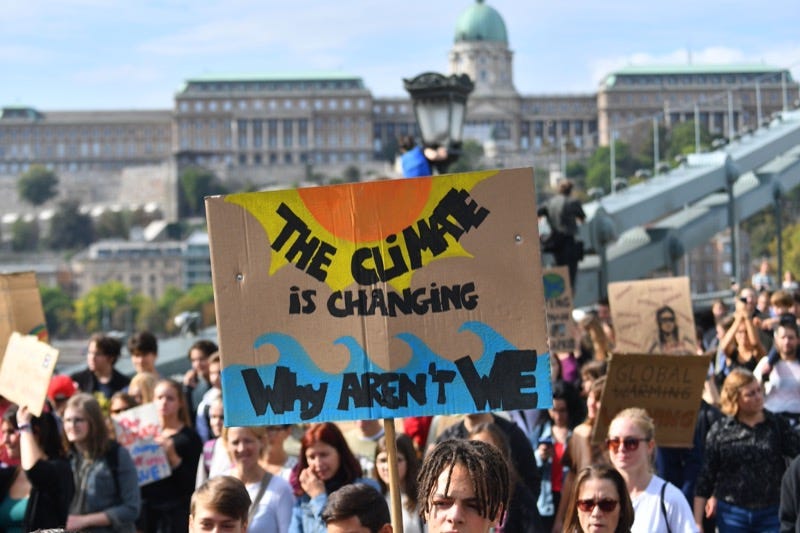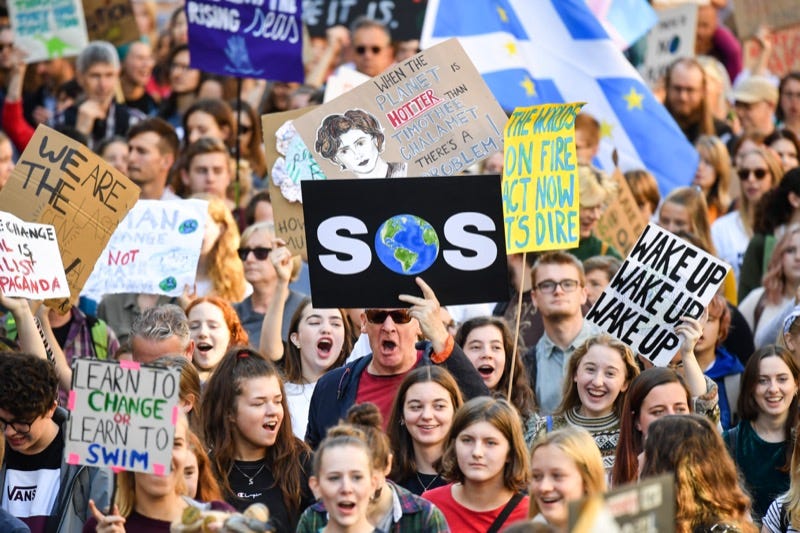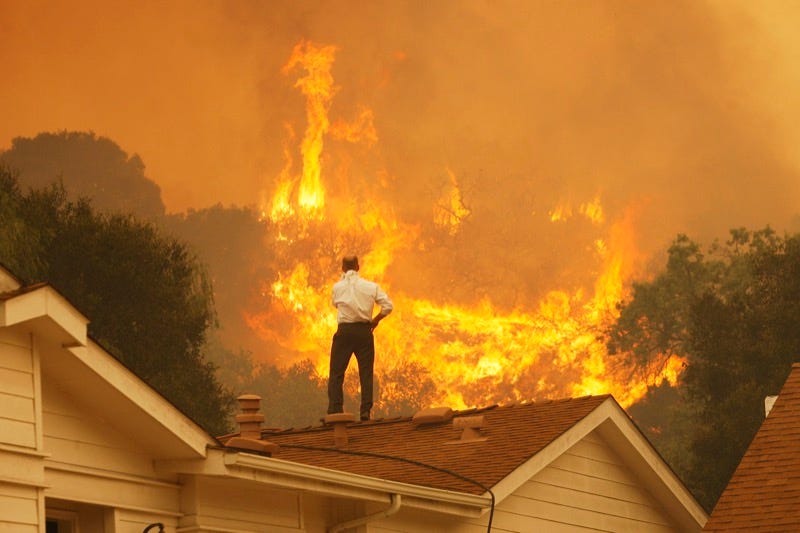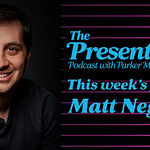Welcome to the Present Age podcast. I’m your host Parker Molloy. Joining me this week is meteorologist and climate scientist Eric Holthaus. Eric operates The Phoenix, a Substack about humanizing the climate emergency.
He’s the author of The Future Earth: A Radical Vision for What’s Possible in the Age of Warming, and he founded Currently, a free subscription weather service.
Parker Molloy: Joining me today is Eric Holthaus. So what I wanted to ask you was, after the IPCC released its most recent report, there were a lot of really downer headlines about it. And when you sent me a copy of your book last year, one thing I liked about it was the fact that it was hopeful and that's not something you really see or hear too much on this topic anymore. Yet it was realistic. Can you tell me a little bit about why it's important to not embrace climate nihilism, I guess?
Eric Holthaus: Thank you so much for inviting me. I think that we don't really have a choice anymore. Honestly, if we are going to do what we need to do in the time we have left, we have to change the narrative. We have to really unlearn that climate change is an inevitable disaster and that we're all going to die, and instead think about it as a justice issue, just like other justice issues, and get angry. And that comes with the realization that a better world is possible, that there are systemic changes that need to happen in every aspect of society anyway, and that's literally what the climate scientists said this week was we have to change every part of human society at a rapid scale in order to get down to the emissions goals that we need to do to preserve the habitability of our planet. What's more important than that, than being able to live on a planet, right? We don't have anywhere else to go. We have to do this.
One thing about that, which the past year has messed with my head a little bit on I guess, is the fact that we're in the middle of this pandemic where you have people who aren't taking these super simple, easy, mild inconveniences to their life, to go get vaccinated or to wear a mask or to stay six feet apart from someone. And I keep thinking to myself, if people won't do that stuff, which feels like the bare minimum, I just don't know how we can expect people to get on board with doing the big things necessary to tackle climate change or tackle any of these larger problems that are facing use, these existential problems, which is something that I've been thinking a lot about lately as it comes to just places that I know that I've lived that have changed for reasons not related to climate.
I just wrote a blog post about how my favorite baseball team is the Chicago Cubs and how Wrigleyville, the area right around the stadium, has changed so much in the past decade that it's just almost unrecognizable and there's this sadness that comes with that. In your book, you've written about how that sadness is applying on a global level. A sort of... I forgot. There was a word you used for it. It's escaping me right now, but it basically this idea that nostalgia for a loss...
That's it! That was it. Do you think that we can actually address this? I want to believe that humanity can come around and address these issues, but at the same time, I feel maybe I'm a bit cynical as far as the politics of any of this goes because a lot of my work has been in monitoring media and that has left me jaded.
Yeah. First off, there's no parallel or precedent for the kinds of change that we're seeing in the entire really existence of humanity. That's what another thing the report said this week was it's been 150,000 years since temperatures were this high. It's been two million years since we've had this much carbon dioxide in the atmosphere. Human civilization is about 100,000 years old and modern humanity, our species is only about two million years old. So we are seeing changes that our species, humans, have never seen before at a rate that is not something that we're built to process. So it's normal for us to feel really weird and uncertain about this time. It's not something that we're built to process to have geological scale change happening in the span of one human lifetime.
So it's normal to feel those weird conflicted feelings because we're trying to make sense of it all in the base back part of our brain as well. It's not just wondering what are we going to do about it, how are we going to motivate people, but it's like we're trying to survive and thrive as animals at the same time. So I think that one way that I've been thinking about is that it takes a lot fewer people than you might expect to create that rapid large-scale change. It's not like... What's it called? The critical mask of vaccination or mask-wearing the herd immunity. We don't have to get 90% of people on board with any particular climate action for it to be effective. We just need really honestly to destroy the fossil fuel industry. That's just the largest, richest, most powerful, most profitable industry in human history.
Simple.
Yeah. So we need to do that, but we also need to embrace the anger and embrace the courage that comes with reading reports like this, knowing that climate change is not something that's just passively happening, it's something that's being done to us. It's an injustice. And right before COVID, we were hitting those critical social movement tipping points of national governments were starting to respond to people in the streets and saying, "Okay, we're going to get on a rapid climate change action trajectory because you're going to shut down the country if we don't." They were afraid, the leaders were afraid, I think for the first time on this issue. And I don't know what it's going to take to get that to happen again, but I know that it will happen again because that is the most effective way of creating rapid change is demanding it. Honestly, in a democracy, that's what we need to do.

Do you think that the answer is in government policy or is it in trying to just encourage companies to do better? That's where I'm always lost when, when it's okay, be angry, push for change, but how? Just your average everyday person, if they want to create change, what should we be pushing for? What sort of policies or actions or attitudes? I mean, because I understand that one thing we have going for is on the side of people who want to prolong humanity is the fact that fossil fuels, the profitability just keeps ticking down as compared to some of the renewables. But what should people like me or anyone listening to this do? What's the policy to argue for it?
That satisfying answer is that you just need to do whatever will get you up in the morning. Honestly, there are so many parts of building this new society that is not extractive, that is focused on regeneration and resilience. So care work, education, public safety, public health, anti-racism, all of those things have to happen in order to do the slow society-changing work, regardless of whatever, carbon tax or whatever is passed. I'm not personally very motivated by calling a senator or protesting or any of that kind of stuff, because it feels too abstract to me. For me, I enjoy teaching my kids about nature or I enjoy taking a break from the screen and going on a walk outside and just thinking for a little bit as what do I want my neighborhood to be like? What feels achievable?
And having conversations with friends, just keeping my motivation up, honestly, because as someone who works on climate change every day, that's a major challenge that I have. I'm in therapy. I couldn't do this without really knowing that there is some hopeful change that's possible. I know everyone needs their time to process and acknowledge what's happening, and there's a place for everyone in the climate movement, you don't have to consider yourself an activist to be someone who's creating effective climate action, but I feel like we have to demonstrate to each other that we can help each other through this time. Because I think for the last couple of 100 years, it's been this every person for themselves mentality in broader society.
And that is something that really doesn't match with a more ecological approach, which is the way we're going to have to restructure all parts of society. So the more that you can get yourself into the mindset I'm part of a network, I'm part of a system, I'm part of an organic thing that can respond and be flexible rather than it's just me on my own. Climate change is not your fault. Climate change is not something that you are personally liable for, but you do have a responsibility to show up, just like you have a responsibility to show up to be anti-racist or you have a responsibility to show up to be a part of broader society. You have to pay your taxes, you have to follow the rules of being a pedestrian. You still have a responsibility to each other. That's what happens in being a member of society, but you don't have to do it all yourself.
I think that one of the problems seems to be the sense of rugged individualism, that I can lift myself up by my bootstraps and if someone else can't, that's their problem. And that's something that we've seen over and over with the pandemic and why that approach has not been a good one because there are a lot of people who I don't quite understand how, but they just don't seem to care about anyone else. And there was an old Huffington Post blog that someone had that was...
I love that.
I don't know how to...
Explain to you that you should care about other people.
I don't know how to explain to you that you should care about other people. That was it. It's something that just sits in the back of my head. Just thinking about that and how true it is. And I think that that's why when you see people angry about the concept of intersectionality, for instance, which is just this understanding that there are all sorts of factors in life pushing in all sorts of different directions. And really the only way out of it is to care about things that don't directly impact you. I'm white obviously, and racism, it doesn't personally harm me in fact. Being white, there are many times in my life without even knowing it, I've probably benefited from racism. The structure of society and so on. But at the same time, I do feel a personal responsibility to push back on that and fight back against that because that's not the way the world should be just because that's the way the world is.
And that's the...
Basic human rights matters.

Yeah. So, that's my view on climate. And I think that that's hopefully a good one. It's hard to tell. It's hard to know what the problems are. Is it that we're living in a world where everyone wants a big yard and they want to spread out and take up as much land and use as much resources as possible or the existence of Exxon? And it's probably more the latter, but all of it plays in together, but sometimes I feel like there's just the sense of okay, I'm doing this to make myself feel better because I can't do anything else. This is the most I can personally do.
It feels like it goes with what you were saying about doing whatever helps you get up in the morning to move forward. And God, I don't know. It's so depressing, but I want to feel optimistic. And I know that it's just one of those topics, it's beyond frustrating, but on a totally... Not totally different topic, but a slightly different topic, I wanted to ask you about Currently. Can you tell me a little bit about that? What it is, how it came to be, what you do, et cetera.
Yeah. So Currently we're building as a weather service for the climate emergency. So a service in the broad sense of that world word in the sense that we're organizing around the weather, we are talking about the weather because the weather is something that's a least common denominator for people to talk about. But also, the weather is political now. The weather is something that connects us to each other in really important and tangible ways. And it's also a very practical thing in the sense that the weather is the main way that we interact with the climate emergency. If there's extreme weather happening, where we are, or if we hear about extreme weather on the news, that's happening somewhere else, we can directly aid each other. We can also help keep ourselves and our family safe if we are informed about the weather. So my idea is that we're partnering with Twitter on this to create conversation spaces and we're doing daily weather newsletters written by a real person that goes beyond what you can just get in your phone app.
It's a real person talking with you about the weather each day. We're also launching an SMS service where in many countries without super well advanced, well-developed weather service like we have in the West, SMS, and WhatsApp are the main ways that people communicate with each other about breaking news or about the weather. So we are in the process of rolling out an SMS weather service for anywhere in the world. You can sign up and we will send you automated messages about if there is an event, some weather alert that's happening where you are, and you can text back to us and we will have a meteorologist respond to you, that will answer your questions. And we're going to do all of this in the context of climate change. So we're partnering with Climate Central, which is a nonprofit that's focused on understanding the connections between weather and climate.
Climate science has advanced to the point where we can in real-time attribute climate and weather disasters to climate change to say, "This event was X percent more likely because of global warming." And also have that scientific understanding of how that connection happens and in this week's IPCC report, was the very first time that was traced back to fossil fuel burning activities. So we know that there's a direct causal link between fossil fuels and extreme weather now. We can literally blame hurricanes on Exxon. That's a scientific fact now, which wasn't necessarily the international consensus as of last week. So this is a major advance in terms of building political movements, building communities organizing around climate, but also just informing us of reality, that factual reality now is that the weather is something that can bring us all together and help us to imagine a better world.
That's my goal with Currently. You can sign up at currentlyhq.com. All the weather newsletters are free. To get access to the SMS service, as well as... We'll send you a gift basket of merch. You can join at $5 a month. And this is a completely independent thing. We're not funding by Twitter at all. We're trying to prove that independent climate journalism can re-imagine what a weather service could be. We're not going to try to compete with a weather channel or anything like that, we're going to add to it this climate service that currently doesn't exist.
It's really interesting to me because one thing I like about it, I guess, one way of saying it, is that places like the weather channel or your evening news telling you the weather, there always seems to be this hesitancy to tie events to climate change because that makes people feel like oh, it's injecting politics into this, but it's not politics. I think that's probably part of the problem, that there's been this reluctance to discuss these things openly in the news. Fox News is going to start its own weather channel now, I guess, that'll be interesting, I suppose.
So we'll be the opposite of the Fox News weather channel.
You will be the factual opposite there, but I really appreciate the work you do and I think that it matters. It's all depressing, but it matters. And I feel like we all have to fight these fights together. And that's why I'm always interested in hearing new ideas, hearing what I can do personally, what we can do collectively as a country or a planet. And I've found that following you on Twitter is a good way to stay up to date with that sort of stuff.
And that's one thing that we're going to try to do with Currently too. We did a couple of reader surveys and the number one thing that people wanted was calls to action, was saying if there's this weather thing that's happening, how can I help? How can I get involved? What can I do? What will actually really matter? What will really make a difference? So, that's going to be one of the main things that we're already doing actually is sending out little prompts to say here's how you can support the Pacific Northwest heatwave. We did a story about farmworkers and Eastern Oregon and how there was a unionization effort that was trying to get cooling centers for farmworkers in Eastern Oregon. So, that was one of the calls to action we had, was support these workers who are literally out there creating our food for us and dying on the job because there's no heat protection. So, that's the kind of stuff that we want to tie into the weather report, which I think is really relevant.
Sure. Several years back I worked at the website Upworthy, which is very odd. I was an awkward fit, but one of the things that would happen would be... And this was in the post you'll never guess what happens next phase of that site, it was when they were trying to do more tangible, original stuff but one thing we found when we were writing about tragedies was that people didn't just want to hear about tragedies. People want to go, "Okay, how can I help? What can I do?" And I think that that's a big part of it, that people want to help...
People care.
Yeah, that gives me hope. The fact that people want to help, but for the most part it's just trying to figure out what to do, where, where should I send money or what should I donate or where should we volunteer? Those are all questions that different people want to engage on different levels. And so that's why I really appreciate that that's what you guys are trying to do.
We have 25 cities right now and we have a mix of meteorologists and poets and artists that are writing about the weather every day in those cities. They live in the communities so they can tell us here's the mutual aid network that has just popped up because the guide on my block is the one that's running it. They have that insight, that local insight, which to me has been fascinating as a weather nerd. I'm learning about the weather all over, understanding how the heat index is different in Vancouver, BC, versus in New Orleans, for example. The thresholds that will impact someone who is unhoused in Vancouver is a very much lower threshold than what I am used to. Because there's no air conditioning in Canada because they don't need it. Historically it doesn't get hot there. So that's really been fascinating to learn the ties and to justice in terms of weather. It's really interesting to me.
Definitely. I'm really excited to see where Currently goes, because what you guys are working on is so cool and so different that I feel like different is what we need generally. But the last thing I just wanted to ask, is there anything else that you want to add that you want to make sure anyone who's listening to this will actually hear?
It's just that everyone has their place. I know it's all depressing and hard to understand and happening too fast, but it's just like COVID, I think, that we were faced with this really shocking, striking change to every aspect of our lives and then we just rolled with it as people were dying around us, we were grieving that, we were loving each other, we were doing all of that work that was necessary as well as learning how to buy the right kind of mask and learning all that stuff. Climate change is that, but for the rest of our lives. It's going to be very hard but it's also very important to understand that we're not doing this just for ourselves, we're doing it because it's the biggest justice issue of our time. It ties in together everything, food, housing, racism, all of that stuff.

This is one way that intersects all of it and supporting each other through that. If you're listening to this, you're probably that climate person in your friend group. You are asked these difficult questions and it's okay to not have the answer, and it's okay to struggle through all of this because I do and this is my job. The only thing I would say is that just ask for help when you need it. Send me a DM if you have to, I'll try to chat with you and encourage you. If you're on any path, then you're on the right path.
That's a good line. If you're on any path, yeah. I mean, unless you're planning to start an oil company, in which case you are on the wrong path.
Exactly.

















